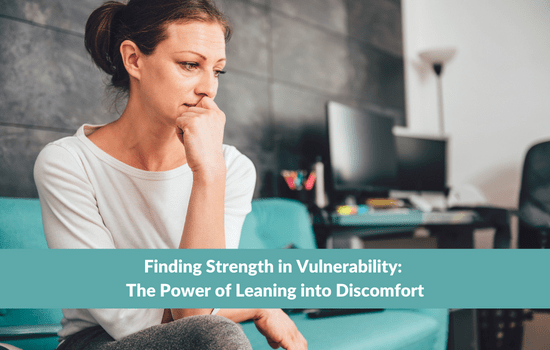Avoiding discomfort to prevent challenges like feeling life's physical, emotional, and mental distress is normal. However, this behaviour negatively affects our growth, development and success.
The Beauty of Discomfort: How Challenges Lead to Success
Feeling Comfortable With Discomfort
How often do you lean into your discomfort? To grow and develop, you must learn to feel comfortable with discomfort. In my lengthy career in senior roles at a large institution, I learned something crucial about discomfort. Failing to lean into challenging situations can stop talented and intelligent people from growth and development. Accepting change and getting out of our comfort zone is essential to personal and professional development.
The following four reasons for leaning into discomfort will empower and motivate you to make the moves you need to advance yourself.

#1 | When You Face Forward, You Move Forward
When you put emotions and feelings on the back burner, it can prevent you from being productive and completing a goal – and the thing is, you will eventually revisit those feelings.
There's no escaping them.
If given a choice, taking the path of least resistance is natural. But you will continue wasting time and energy until you work through your emotions and face discomfort if you do this!
Instead of dodging your feelings, you need to move toward them and eventually work through the discomfort until it’s no longer uncomfortable.
Wondering what that looks like? Let's say you're struggling with a challenge at work - maybe it's a project you've been putting off. Don’t walk away when you start to feel discomfort.
Instead, look at it differently: could this be a lesson in disguise? Is there something you need to learn about relationships, conflict, money, friends or work? Take time to consider the situation. Then, if you still feel like walking away the second time, stop yourself.
Take a deep breath and try again. Change your behaviour by breaking any pattern of giving up or taking the path of least resistance,
#2 | The Results May Surprise You
When you lean into discomfort and make it through to the other side, you'll often feel a heightened sense of confidence - armed with the knowledge that you CAN overcome challenges. Often it is just a matter of adjusting your behaviour and adopting a growth mindset.
A great time to practise leaning into your discomfort is during a workout. Add one more minute when you think you have done all you can on the treadmill or out for a jog. Then, when that minute is up, add one more. You may surprise yourself with what you can do when you don't allow yourself to quit or take the easy way out!
#3 | It Gets Easier With Practice
Leaning into your discomfort gets easier as you practise strategies and work through challenges. Eventually, you won't even think of avoiding negative feelings or emotions. It can become second nature to do something difficult because, deep down, you know there's something better waiting on the other side.
If you begin by learning to be just a little comfortable with resistance, you can gradually manage any challenge that arises with experience.
#4 | It’s Okay Be Feel Uncomfortable
Discomfort is a part of life. Unfortunately, trying to outrun what life dishes you up means you'll be served that same meal repeatedly. Leaning into life's challenges IS part of life—it makes you strong, capable, and successful. It's also what can make you a leader.
We enhance our self-awareness by leaning into our discomfort and pushing ourselves each time without giving up immediately.
These four reasons are part of an important lesson: It's empowering to achieve goals we feel are too complex. After all, being stretched and challenged only brings out the best in us.
Personal Growth And Development Occur When You Lean Into Your Discomfort
Leaning into discomfort can be beneficial for personal growth and development. Here are some reasons why:
- Facing discomfort builds resilience, enabling you to cope better with challenges and setbacks in the future.
- Embracing discomfort leads to learning opportunities like new experiences and lessons that can broaden your knowledge and understanding.
- Stepping out of your comfort zone gradually expands it, making you more adaptable to change.
- Confronting discomfort helps you face and conquer your fears, fostering confidence and self-assurance.
- Exploring unfamiliar territory can spark creativity and innovative thinking.
- Addressing discomfort requires problem-solving and honing your ability to find solutions.
- Discomfort can reveal aspects of yourself that you may not have been aware of, leading to personal growth.
- Pushing yourself beyond your comfort zone can increase empathy and understanding for others facing challenges.
- Embracing discomfort can lead to achieving goals and reaching new heights to succeed.
- Challenging situations can create bonds with others going through similar experiences, making meaningful connections.
Personal growth and development hinge on working through uncomfortable feelings and challenges. Embracing discomfort in a balanced and mindful manner is essential to caring for your well-being while pushing your boundaries.
If you want to build growth and development opportunities so your personal and professional growth soars, you will want to focus on strengthening your emotional intelligence. Here are suggestions to accomplish this goal: Take emotional intelligence training, and get a copy of my book, The Power of Emotion, another opportunity to learn more about your EI.
This article was originally published on November 18, 2017, and has been updated (July 2023).
More Motivational Reads Here »
How Emotionally Intelligent Are You?
Sign up for Linda’s monthly tips to build your Emotional Intelligence and reduce Emotional Hijacking!

















